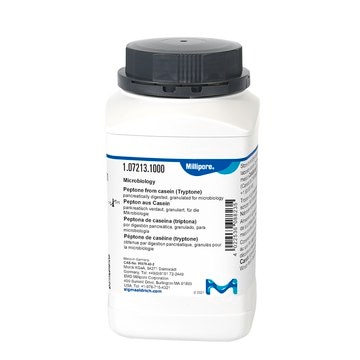T9410
Casein Peptone
Enzymatic digest of casein from bovine milk, 11.4-13.9% total nitrogen, suitable for biotechnology and microbiology
Synonym(s):
Peptone from casein, Peptone from casein, casein tryptic digested, Tryptone
About This Item
Recommended Products
product name
Tryptone, Pancreatic digest of casein, Suitable for microbiology
biological source
bovine milk
Quality Level
form
powder
packaging
poly bottle of 1 kg
poly bottle of 250 g
nitrogen analysis
11.4-13.9% total
loss
≤11% loss on drying
pH
6.6-7.4
application(s)
microbiology
Looking for similar products? Visit Product Comparison Guide
General description
Application
Storage Class Code
11 - Combustible Solids
WGK
WGK 1
Flash Point(F)
Not applicable
Flash Point(C)
Not applicable
Personal Protective Equipment
Choose from one of the most recent versions:
Certificates of Analysis (COA)
Don't see the Right Version?
If you require a particular version, you can look up a specific certificate by the Lot or Batch number.
Already Own This Product?
Find documentation for the products that you have recently purchased in the Document Library.
Customers Also Viewed
Our team of scientists has experience in all areas of research including Life Science, Material Science, Chemical Synthesis, Chromatography, Analytical and many others.
Contact Technical Service












